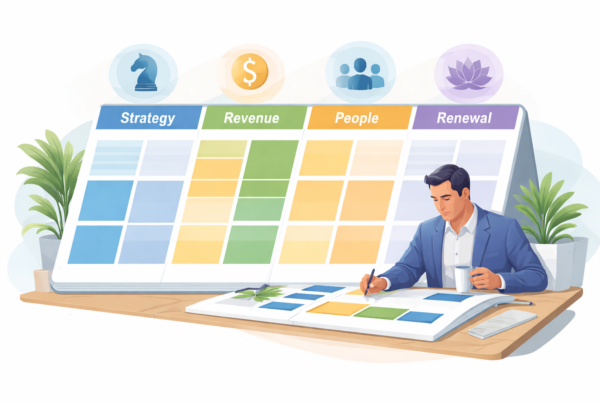The Most Effective Employee Retention Strategies
In today’s highly competitive job market, retaining top talent is more crucial than ever. But how exactly can organizations ensure that their best employees remain loyal and engaged? This blog post will explore the most effective employee retention strategies, from fostering a positive company culture to offering competitive compensation packages and professional development opportunities. By understanding and implementing these strategies, your organization can enjoy a more stable and productive workforce, ultimately leading to greater success.

Short Summary
- Employee retention is essential for organizational success, and Human Resource Management (HRM) plays a key role in creating effective strategies.
- Building positive company culture through core values, mission, diversity & inclusion. Providing competitive compensation & benefits. Offering professional development opportunities are important elements of employee retention.
- Supporting employee well-being by providing mental health support and physical health/wellness programs can improve engagement and satisfaction.
Understanding Employee Retention

Employee retention refers to the strategies an organization employs to retain its employees, and an effective employee retention strategy is crucial for organizational success. High employee turnover can be costly regarding financial expenses and the loss of valuable institutional knowledge. Implementing the correct practices and strategies can help ensure that your most valued personnel remain in the organization, reducing the chances that these valuable employees will quit due to dissatisfaction or better opportunities elsewhere.
Human resource management is pivotal in developing and executing employee retention strategies, including providing competitive compensation and benefits, offering professional development opportunities, and fostering positive company culture. By understanding the factors contributing to employee satisfaction and engagement, HR professionals can develop and implement effective retention strategies that address employees’ unique needs and preferences.
Importance of Employee Retention
Adopting the right employee retention strategies can help boost employee retention, reduce turnover costs, safeguard institutional knowledge, and sustain team morale. Employees who feel valued and engaged are likelier to stay with the company and contribute to its success.
Additionally, a higher employee retention rate often indicates higher employee job satisfaction within the organization. By recognizing the importance of employee retention, companies can prioritize the well-being of their employees and enjoy the benefits of a stable and committed workforce.
The Role of Human Resource Management
HR professionals play a vital role in developing and executing retention strategies, including monitoring employee satisfaction and addressing related concerns. They are responsible for designing and implementing retention strategies that cater to employees’ needs and preferences, ensuring a healthy work-life balance and offering professional development opportunities.
HR also plays a pivotal role in onboarding new workers, providing them with the necessary training and orientation to understand the company culture, and ensuring successful employee retention. By understanding the unique needs and preferences of the workforce, HR can develop customized retention strategies that will resonate with employees and support their long-term commitment to the organization.
Building a Positive Company Culture

Creating a positive company culture is essential to build employee engagement and retention, as it helps establish core values and mission and encourages diversity and inclusion to attract and retain high-calibre talent. A positive company culture fosters employee engagement and satisfaction, increasing employee retention and organizational success.
To build a positive company culture, organizations must focus on developing and communicating their core values and mission and promoting diversity and inclusion in the workplace. Employees are more likely to feel a sense of belonging and purpose when they understand and align with the company’s values and mission.
By cultivating a company culture that embraces diversity and inclusion, organizations can create an environment where all employees feel valued, respected, and supported, leading to higher employee retention rates.
Core Values and Mission
Developing and communicating core values and mission is crucial for fostering a sense of purpose and belonging among employees. Core values are the foundation of an organization’s vision, mission, and principles and may include integrity, accountability, and collaboration. To ensure that all employees understand core values and mission, they should be clearly stated in all company documents, such as the employee handbook, job descriptions, and company policies.
Additionally, it is beneficial to reinforce these core values and mission regularly through company meetings, emails, and other communication channels. By emphasizing the importance of core values and mission, organizations can create a positive company culture that attracts and retains top talent.
Diversity and Inclusion
Emphasizing diversity and inclusion in the workplace is essential for creating a welcoming and supportive environment for all employees. A diverse workforce brings different perspectives, experiences, and ideas, which can lead to increased innovation and better decision-making.
By fostering a culture of inclusion, organizations can ensure that all employees feel valued and respected, leading to higher employee engagement and increased employee retention. By promoting diversity and inclusion, companies can create a positive company culture that retains top talent and drives organizational success.
Competitive Compensation and Benefits

Attracting and retaining top talent requires offering competitive compensation and benefits packages. Adequate remuneration is a critical factor in employee retention, as it can prevent a departing employee from seeking better compensation elsewhere. Research indicates that 35% of employees would leave their job for a better compensation package. By providing competitive salaries, bonuses, and comprehensive benefits, companies can demonstrate their commitment to employees and attract top talent in the job market.
In addition to offering competitive compensation, companies must provide comprehensive benefits packages catering to employees’ unique needs and preferences, encompassing health insurance, retirement plans, and other perks. By offering a combination of competitive compensation and comprehensive benefits, organizations can create a strong value proposition that appeals to potential employees and promotes employee retention.
Salary and Bonuses
Ensuring fair and competitive salaries is essential for retaining employees, as it directly impacts their job satisfaction and engagement. In addition to offering competitive salaries, companies should also provide bonuses for exceptional performance. Bonuses can be utilized to reward employees for surpassing goals or taking on extra responsibilities and motivate them to remain with the company for an extended period.
Employers can demonstrate their commitment to employees by providing competitive salaries and bonuses and fostering a sense of appreciation for employees work and value.
Comprehensive Benefits Packages
Offering comprehensive benefits packages is crucial for attracting and retaining top talent. These packages typically encompass health insurance, retirement plans, and other benefits, such as wellness programs and tuition reimbursement. Companies can cater to employees’ unique needs and preferences by providing a wide range of benefits, ultimately increasing satisfaction and retention.
In addition to offering competitive compensation, employers should continuously evaluate and update their benefits packages to ensure they remain attractive and relevant to their workforce.
🚀**Boost Your Employee Retention and Skyrocket Your Business Growth!**🚀
Are you struggling to keep your top talent and maintain a thriving work environment? Don’t let your valuable employees slip through your fingers – invest in effective employee retention strategies today!
As an experienced business coach, I can help you identify the key factors affecting your employee turnover and craft a tailor-made action plan to transform your company culture.
Don’t wait any longer! Connect with me today to take the first step towards a more successful, productive, and engaged team.
🌟Schedule a FREE 30-minute consultation with me now🌟 and unlock the secrets of high employee retention for your business. Together, we’ll create a future where your employees are excited to come to work every day!
Professional Development Opportunities

Professional development opportunities are essential for employee retention, enabling employees to grow and advance within the organization. Companies can demonstrate their commitment to employees’ professional growth and development by offering training, upskilling, and career advancement opportunities. This, in turn, can lead to increased employee satisfaction and retention, as employees feel motivated to stay with the company and continue developing their skills and knowledge.
In addition to providing professional development opportunities, companies should create clear career advancement paths for employees. This can help prevent stagnation and ensure employees are constantly motivated to improve and advance within the organization. By implementing effective professional development strategies, companies can retain top talent and foster a culture of continuous learning and growth.
Training and Upskilling
Offering training programs and upskilling opportunities can help employees grow and develop new skills, increasing productivity and retention. By providing access to industry-specific training and development resources, companies can ensure that employees stay up-to-date with the latest trends and technologies and remain valuable contributors to the organization.
Employers can create comprehensive training plans, provide access to online learning resources, and offer mentorship programs to support employees’ professional growth and development.
Career Advancement Paths
Creating clear career advancement paths more compelling job opportunities is crucial for motivating employees and preventing organizational stagnation. By offering opportunities for employees to develop new skills and advance in their careers, companies can demonstrate their commitment to employee growth and development.
Employers can foster career advancement paths and retain employees by providing training, education, and development programs and offering opportunities for employees to take on additional responsibilities and challenges within the organization. By establishing clear career advancement paths, companies can ensure employees remain engaged and motivated to excel within the organization.
Flexible Work Arrangements

Implementing flexible work arrangements, such as remote and hybrid work options and flexible scheduling, can significantly impact employee retention. These arrangements allow employees to effectively balance their work and personal lives, increasing satisfaction and retention. Research indicates that employees who can work remotely or on a flexible schedule are more likely to stay with the company and contribute to its success.
Flexible work arrangements can also benefit employers by reducing overhead costs, increasing productivity, and providing access to a broader talent pool. By accommodating employees’ needs and preferences with flexible work arrangements, companies can create a more supportive and inclusive work environment, ultimately leading to greater employee retention and organizational success.
Remote and Hybrid Work Options
Embracing remote work and hybrid work options can provide employees with greater work-life balance and autonomy, ultimately leading to increased satisfaction and retention. Remote and hybrid work arrangements allow employees to work from home or other remote locations and combine remote and in-office work, making it easier for them to transition into a new job.
By offering these options, companies can cater to employees’ diverse needs and preferences, ensuring they remain engaged and committed to the organization’s success.
Flexible Scheduling
Allowing flexible scheduling can help accommodate employees’ personal and family needs, increasing satisfaction and retention. Flexible scheduling enables employees to adjust their work hours to suit their individual circumstances better, reducing stress and promoting a healthier work-life balance.
By providing flexible scheduling options, companies can demonstrate their commitment to employee well-being and foster a supportive work environment that values employees’ unique needs and preferences.
Employee Recognition and Rewards

Recognizing and rewarding employees is essential to employee retention, as it helps boost morale and motivation. Companies can acknowledge employees’ efforts and accomplishments by providing regular feedback and praise and implementing reward programs, making them feel valued and appreciated. This, in turn, can lead to increased employee engagement, satisfaction, and retention, as employees feel motivated to continue contributing to the organization’s success.
Employee recognition and rewards can take many forms, from simple words of appreciation to more formal programs and incentives. By implementing various recognition and reward strategies, companies can ensure that employees feel acknowledged and valued for their contributions, ultimately fostering a positive and supportive work environment.
Regular Feedback and Praise
Regular feedback and praise can foster employee engagement and productivity, set clear objectives and milestones, aid employees in assessing their performance, encourage employees, and reinforce desirable behaviour. Regular feedback also helps employees feel more confident in their performance and more devoted to demonstrating positive behaviour, which is essential for employee success.
Managers should conduct regular one-on-one sessions with employees to offer constructive feedback, review their professional ambitions and objectives, and promote innovative ideas. Companies can acknowledge employees’ efforts and accomplishments by providing regular feedback and praise, ultimately fostering a sense of appreciation and value.
Reward Programs
Implementing reward programs can incentivize exceptional performance and recognize employee achievements. Reward programs can take various forms, such as employee engagement software that utilizes gamification and other methods to recognize staff and offer rewards and perks like retail discounts.
By offering a range of incentives and rewards, companies can motivate employees to surpass goals, take on extra responsibilities, and remain committed to the organization’s ability for an extended period. Reward programs boost employee morale and motivation and contribute to the organization’s overall success.
Supporting Employee Well-being

Supporting employee well-being is essential for employee retention, as it can directly impact employees’ satisfaction, engagement, and overall health. By offering mental health support and promoting physical health and wellness initiatives, companies can demonstrate their commitment to employee well-being and create a more supportive and inclusive work environment.
Supporting employee well-being can lead to a healthier workforce, decreased healthcare costs, fewer absences due to illness, and enhanced mental well-being. Companies can foster a positive and supportive work environment by addressing employees’ mental and physical health needs, increasing employee retention and organizational success.
Mental Health Support
Providing mental health support is crucial for employee retention, as it fosters feelings of appreciation and worth among employees, decreases stress levels, and enhances overall well-being. Mental health support can take various forms, such as counselling services, stress management resources, and promoting a healthy work-life balance.
By acknowledging and addressing employees’ mental health needs, companies can demonstrate their commitment to employee well-being and create a more supportive and inclusive work environment.
Physical Health and Wellness
Encouraging physical health and wellness in the workplace is essential for employee retention, as it can result in a healthier workforce, decreased healthcare costs, and enhanced mental well-being. Companies can support employees’ physical health by offering fitness programs and wellness benefits and promoting a healthy work environment.
Companies can foster a positive and supportive work environment by addressing employees’ physical health needs, increasing employee retention and organizational success.
Implementing Effective Employee Retention Strategies

Implementing effective employee retention strategies requires considering the unique needs and preferences of the workforce, as well as continuously monitoring and adjusting strategies to ensure success. By understanding the factors contributing to employee satisfaction and engagement, companies can develop and implement customized talent retention and strategies that resonate with employees and support their long-term commitment to the organization.
Continuous evaluation and adjustment of retention strategies are crucial for maintaining a stable and productive workforce. Companies can ensure that their employee retention efforts remain effective and relevant to their workforce’s ever-changing needs and preferences by regularly assessing the success of implemented strategies and making necessary adjustments.
Summary
In conclusion, employee retention is a critical aspect of organizational success. Companies can ensure a stable, engaged, and productive workforce by implementing effective retention strategies such as fostering positive company culture, offering competitive compensation and benefits, providing professional development opportunities, implementing flexible work arrangements, recognizing and rewarding employees, and supporting employee well-being. By continuously monitoring and adjusting these strategies, organizations can create a supportive and inclusive work environment where employees feel valued, appreciated, and committed to contributing to the company’s long-term success.
Frequently Asked Questions
What are the 4 pillars of employee retention?
The four key pillars to improving employee retention are creating a positive work culture, providing competitive rewards and recognition, offering meaningful career paths, and encouraging effective communication.
Employers can increase employee morale and satisfaction by focusing on these key points, resulting in higher productivity levels and a healthier workplace.
What are the 5 main drivers of employee retention?
Organizations must focus on leadership, frequent feedback and recognition, career advancement opportunities, competitive compensation packages, and a balance between work and personal life to maximize employee retention.
These five drivers create an environment that nurtures employee loyalty and long-term engagement.
What is an employee retention strategy?
An employee retention strategy is a set of practices and programs to reduce turnover and promote employee engagement. Strategies may include regular communication with staff, competitive compensation, providing incentives and training opportunities, and creating an environment of respect and inclusion.
What is employee retention? Why is it important?
Employee retention is important because it affects an organization’s costs and productivity. It can also affect employee morale, engagement, and performance. When employees are retained for longer, they become more experienced in their roles and form a stronger bond with the company, resulting in better team cohesion and efficiency.
Therefore, companies should prioritize effective strategies for improving employee retention.
What are the main factors that contribute to employee satisfaction and retention?
Employee satisfaction and retention are driven by offering competitive compensation and benefits, providing professional development opportunities, having flexible work arrangements, fostering a positive company culture, and investing in employee well-being.
These elements are essential for creating a positive work environment and ensuring employees feel valued and appreciated. Companies should strive to create an environment encouraging employees to stay and grow with the organization. This can be achieved by offering competitive salaries, professional development opportunities, and flexibility.
🚀**Boost Your Employee Retention and Skyrocket Your Business Growth!**🚀
Are you struggling to keep your top talent and maintain a thriving work environment? Don’t let your valuable employees slip through your fingers – invest in effective employee retention strategies today!
As an experienced business coach, I can help you identify the key factors affecting your employee turnover and craft a tailor-made action plan to transform your company culture.
Don’t wait any longer! Connect with me today to take the first step towards a more successful, productive, and engaged team.
🌟Schedule a FREE 30-minute consultation with me now🌟 and unlock the secrets of high employee retention for your business. Together, we’ll create a future where your employees are excited to come to work every day!



